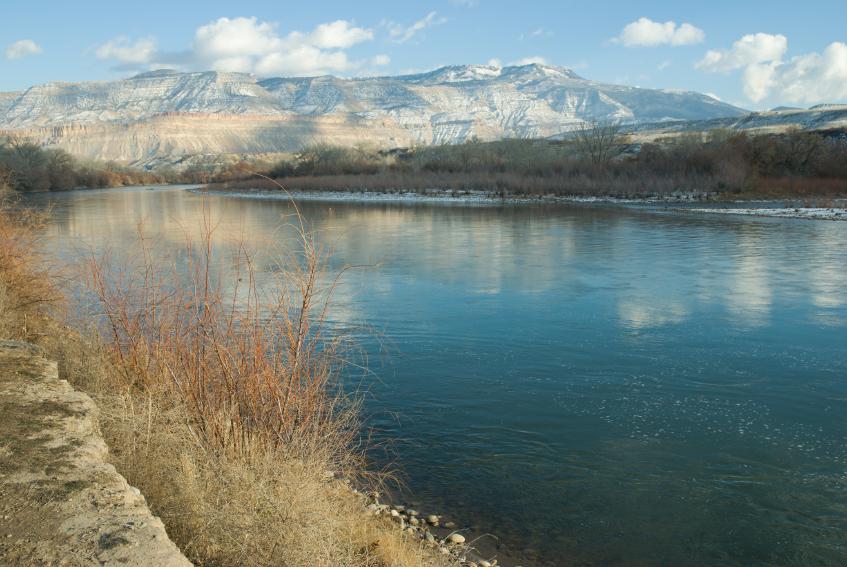

When Colorado River District officials caught wind of investment companies recently buying western Colorado ranches with ample senior water rights, including one north of Fruita, it got their attention.
The district, which includes Mesa County and 14 other counties and focuses on the protection, conservation, use and development of Colorado River water in western Colorado, long has been concerned about protecting the region’s agricultural sector. Now district staff are worried about a potential new threat to it, from investment companies buying water rights possibly as a speculative investment, and looking to profit later in deals that could lead to some local agricultural land no longer being irrigated and reverting to desert.
For the river district, the concern is keeping the Western Slope from eventually seeing the kind of widespread drying up of agricultural lands and withering of local farming and ranching economies that has occurred in areas of eastern Colorado over the decades as municipalities have bought up water rights.
District general counsel Peter Fleming addressed some of the acquisitions and their potentially speculative nature in a January memo to the board of the river district.
“For example, a New York hedge fund called Water Asset Management (through one of its many subsidiaries) acquired a 330-acre farm within the Grand Valley Project in mid-September 2017. While not a huge farm, that size is among the larger-sized parcels within the Grand Valley Project,” Fleming wrote in his memo, referring to the local Bureau of Reclamation irrigation project.
He told the board the farm’s associated historical consumption depends on numerous factors but could be about 840 acre-feet a year. An acre-foot is about 326,000 gallons.
That New York City company paid $3.83 million to Gary and Christi Flynn to acquire the farm located along the main access road to popular mountain bike trails on nearby federal lands.
In his memo, Fleming also cited a purchase by Boulder-based real estate investment and management company Conscience Bay Co. of western Colorado, including the 1,450-acre Harts Basin Ranch near Cedaredge in Delta County.
“To our knowledge, the properties continue to be operated as they have historically and there are no current plans to change the associated water rights or move the water off the land,” Fleming wrote. “However, it is clear that increasing water demands, reduced supply, and the potential risk of compact curtailment have put a more direct focus on West Slope irrigated agriculture. Stated another way, reality has caught up with our historical paranoia about the acquisition and potential dry-up of West Slope agricultural rights for speculative purposes.”
By “compact curtailment,” Fleming was referring to the ever-looming possibility of Colorado someday having to curtail its water use in order to keep meeting obligations to states in the lower Colorado River Basin under a 1922 interstate compact.
“While speculation in land and water rights is nothing new, the recent acquisitions appear to be keyed-in on acquisition of pre-compact water rights to hold for the present time but sell to the highest bidder during compact-curtailment/administration,” Fleming wrote.
Fleming said in an interview with The Daily Sentinel that in Colorado, senior, primarily agricultural water rights would have priority in the case of curtailment. That makes those water rights attractive to water users with junior rights, such as Front Range municipalities, which might be able to continue diversions under junior rights under a compact curtailment while sending water associated with a senior right downstream to make up for it.
Another concern for the river district is the prospect of financial agreements being made where the water isn’t used for irrigation but instead flows out of state, perhaps to be stored in Lake Powell and held in a buyer’s account should something such as a drought or compact curtailment occur.
Perhaps contributing to the river district’s concern is the fact that Water Asset Management’s website indicates that the investment vehicle it used in the Fruita acquisition primarily acquires water resources at agricultural value, with the intention of later reselling those resources to higher-value municipal, industrial and environmental consumers.
Water Asset Management didn’t return calls for comment for this story, and the Flynns declined to comment.
Conscience Bay representatives plan to meet with river district officials this month.
“I do think that we will be able to satisfy them that we’re not a threat. In fact, we’re going to be a partner with them in trying to help solve water problems,” said Eli Feldman, the company’s president.
Conscience Bay paid nearly $8 million last year to acquire not just the 1,450-acre ranch Fleming referred to in Fleming’s memo, but also adjacent acreage that resulted in a ranch 3,200 acres in size. Conscience Bay also has owned a 600-acre ranch in the Steamboat Springs area for about a decade, besides having commercial property investments.
“We’ve never sold any water to anybody,” Feldman said. “We’ve never done any (water) transfers of any nature, really.”
He said water is only a secondary interest for the company’s agricultural investments.
“Our primary interest in these ranches is their agricultural value and long-term food production,” he said.
He said the people at Conscience Bay are long-term investors, and the long-term appreciation of ranchland and farmland combined with the return on investment from ranching makes it a competitive investment compared to other options out there.
The river district’s new general manager, Andy Mueller, said the district is looking forward to its upcoming meeting with Conscience Bay representatives. He said district officials recently “had a good discussion” with representatives of Water Asset Management.
“I can say that they are actively acquiring properties in the Grand Valley,” Mueller said. “They also say they are primarily interested in them as working agricultural assets.”
He said the company expressed interest in participating in a voluntary, compensated temporary fallowing program.
Feldman said Conscience Bay likewise is interested in exploring things such as temporary fallowing that could free up some water for municipal, fishery, environmental or other uses. He believes such programs would provide agricultural operators some valuable income, especially in dry years when farming might be that much tougher. In times when agricultural commodity prices are low, it could help preserve ag land that might otherwise be subject to buying and drying to meet municipal needs.
“If you can add a new source of revenue for that (agricultural) community I think it would be fantastic and allow them to really hold out for the long haul,” Feldman said.
Fleming said it’s important that any such approach occur in a limited, measured way that protects collateral local economic interests such as sellers of fertilizer, trucks and farm implements, and that lands aren’t taken out of production for good.
For now, Mueller noted, while fallowing programs are being explored, none is in place on a permanent basis in the region.
He said the river district hopes to continue to be engaged with companies like Water Asset Management and Conscience Bay and emphasize the priority the district places on Western Slope agriculture.
“Frankly, we would like to study their financial models and their methods of operation to verify that the goal is really the long-term preservation of our agricultural communities,” he said.
He said the district is hoping to understand what makes the properties being acquired appear to be good investments from a water standpoint. He said a concern is that “investors who are not agricultural producers themselves may drive an economic model that would require a higher or faster return than a very limited fallowing program that may exist.”
Information from: The Daily Sentinel








